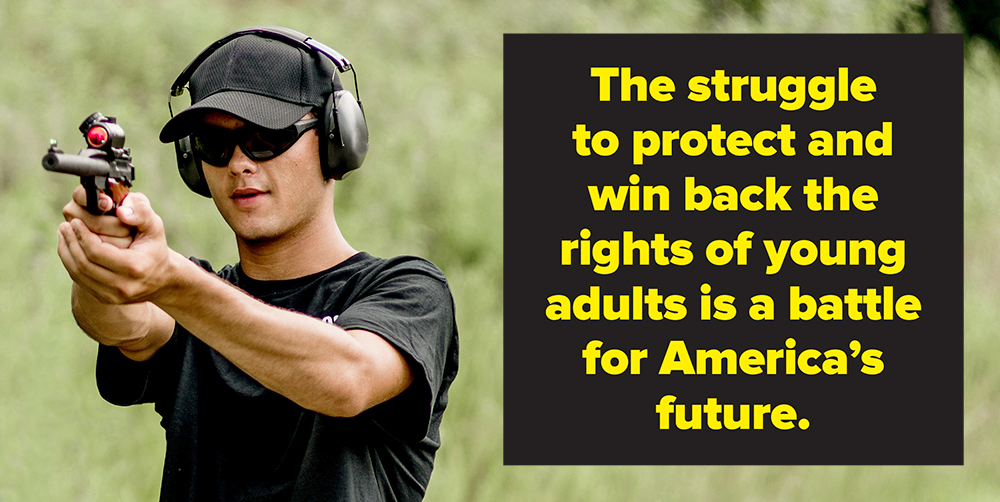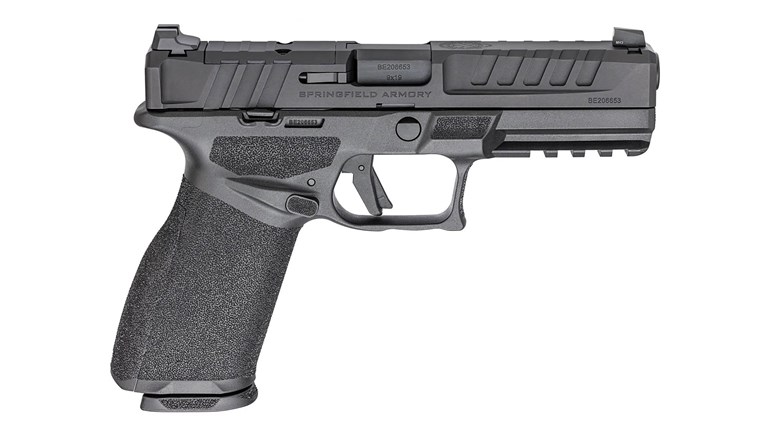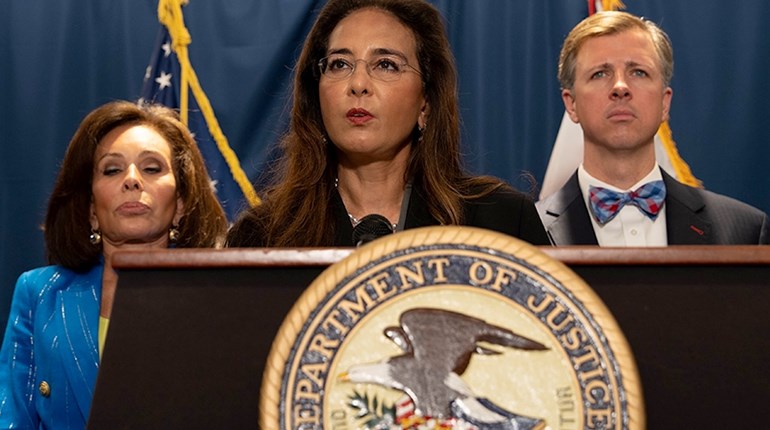
Gun-control groups, and the politicians they support, are doing all they can to take Second Amendment rights away from 18-to-20-year-old citizens. But, to do so, they aren’t making the argument that we should redefine what constitutes a legal adult. That would be much more difficult to enact—and, if successful, it would also disenfranchise young voters. Instead, they simply want to take away this group’s right to keep and bear arms.
If they can’t outright repeal the Second Amendment, these groups and politicians are okay with attacking gun ownership at the margins. This is an old approach. That Latin phrase “divide et impera” (divide and rule) has been around for eons: it is more commonly said in English as “divide and conquer.” In essence, it is the principle of conquest by inciting internal divisions in your enemies to break off factions. Gun-control groups often employ this tactic.
For instance, not that long ago, relatively few citizens owned suppressors and most people didn’t know that much about them. Consequently, anti-Second Amendment advocates exploited most politicians’ dearth of knowledge about suppressors when many informed legislators were considering deregulating the hearing-saving devices. In this case, their strategy has thus far worked on the federal level. Fortunately, it hasn’t worked in a majority of the states, as 42 states have now gotten out of the way of this freedom.
The effort to stigmatize and ban so-called “assault weapons” is another example. In the 1980s, gun-control groups began to promote calling certain semi-automatic rifles “assault weapons” as part of an effort to stigmatize them in order to get them banned. This is part of what made it politically feasible for the 1994 federal ban on the sale of these rifles. The story didn’t end there, of course; actually, a backlash ensued by American citizens who want their freedom, and these firearms have become some of the most-popular arms to law-abiding gun owners.
A current example of the divide-and-conquer strategy from the gun-control crowd is the effort to restrict the rights of 18-to-20-year-old citizens. Anti-Second Amendment advocates seem to believe that, since the vast majority of gun owners are older than 20, they can get away with stopping young adults from buying guns.
President Joe Biden (D) has been pushing to clamp down on these young adults’ right to keep and bear arms; for example, in a speech last year, the president specifically mentioned adults in this age group when pushing to ban “assault weapons.”
“If we can’t ban assault weapons, as we should, we must at least raise the age to be able to purchase one to 21,” said Biden.
More recently, Biden managed to get expanded background checks passed that target these young Americans. When Congress passed last year’s duplicitous Bipartisan Safer Communities Act (BSCA)—against the National Rifle Association’s objections and warnings—it expanded the background check process for gun purchasers who are 18-to-20-years old by requiring that the National Instant Criminal Background Check System (NICS) check juvenile criminal records and state mental-health records, and to seek additional records from local law enforcement where the buyer resides. Since a process to do that smoothly doesn’t exist, the provision has caused a de facto waiting period for young adult gun purchasers as agencies take days, or even weeks, to try to provide those records..
The Growing Struggle
Indeed, President Biden isn’t the only politician who has targeted these young adults for infringement of their constitutional rights, and anti-Second Amendment groups have joined in with a fervor. If you listen to them, you’d think every 18-to-20-year-old American is some kind of a ticking timebomb.
The gun-control group the Violence Policy Center (VPC) has made infringing on the rights of 18-20-year olds a priority. “The goal on both the state and federal levels should be a ban on the possession of long guns and handguns for those under the age of 21,” the VPC stated in a report. The VPC also said that the “best practice is to ban assault weapons as a class entirely … .”
Note that some states are taking VPC’s poor advice without considering whether their proposals actually solve any problem or are constitutional. Back in May, Assembly Bill 355 in the Nevada legislature would have denied 18-to-20-year olds’ Second Amendment rights by prohibiting them from possessing semi-automatic rifles and shotguns.
The Nevada House and Senate both passed the measure, sending it to Gov. Joe Lombardo’s (R) desk for consideration. Lombardo vetoed the measure. He said, “I will not support legislation that infringes on the constitutional rights of Nevadans.”
Unfortunately, some within the judicial system have joined in the assault against young Americans wishing to practice their Second Amendment-protected rights. Writing for the minority in a California case challenging the state’s law prohibiting the sale of modern semi-automatics to those under 21, Judge Sidney Stein argued that the infringement must be protected because statistics show that Californians in the 18-to-20-year-old age group are more likely to commit violent crimes than those who are 21 and older.
“Neglecting consideration of either the disproportionate perpetration of violent crime by, or the relatively immature and variable cognitive development among, adults under age 21, the majority opinion fails to conduct a legal analysis that comports with the corpus of precedent within this Circuit and elsewhere,” wrote Judge Stein. “Not only in my view is it error for the majority to apply strict scrutiny to the semi-automatic rifle regulation, but its alternative holding that the regulation fails under intermediate scrutiny suffers from a faulty assessment of whether the regulation is a ‘reasonable fit’ for California’s public policy objectives.”
In other words, Judge Stein believes the ban should stay in place for all 18-to-20-year olds because a tiny percentage of them use firearms to commit crimes. Notice that he doesn’t note that many, if not most, of the young adults doing such things are gang members who prefer semi-automatic pistols. Banning popular rifles does not address this problem—not that banning pistols would, either. The way to do reduce these crimes is obviously to arrest and prosecute violent gang members and to support young people in ways that prevent them from becoming criminals.
Roadblock to Progress
One aspect of trying to fight this battle in court is the slow-moving nature of the American judicial system. In one of the most-pointed decisions yet, the Fourth Circuit Court of Appeals struck down the federal law prohibiting Americans from purchasing handguns before they were 21. The case—Hirschfeld v. Bureau of Alcohol, Tobacco, Firearms and Explosives—revolved around two plaintiffs, including an 18-year-old Virginia woman who filed for and received a restraining order against her ex. In her desperation to try to keep the man from hurting or even killing her, she went to her local gun shop, but was told she couldn’t purchase a handgun to protect herself because of federal law.
“We hold that the challenged federal laws and regulations are unconstitutional under the Second Amendment,” Circuit Court Judge Julius Richardson wrote in the 2-1 decision. “Despite the weighty interest in reducing crime and violence, we refuse to relegate either the Second Amendment or 18-to-20-year-olds to a second-class status.”
According to the ruling, the important question was when Americans can legally begin enjoying the rights protected for all of us in the U.S. Constitution.
“When do constitutional rights vest?” wrote Richardson. “At 18 or 21? 16 or 25? Why not 13 or 33? In the law, a line must sometimes be drawn. But there must be a reason why constitutional rights cannot be enjoyed until a certain age. Our nation’s most cherished constitutional rights vest no later than 18. And the Second Amendment’s right to keep and bear arms is no different.”
While that was a major victory for freedom, only a few months later, the same judge threw out the decision because Marshall had reached age 21, so she was no longer being unconstitutionally infringed. The other plaintiff in the case had been removed earlier in the judicial process when he turned 21, rendering his claims moot.
Recent Victories
Still, victories for these young Americans have become much more commonplace, especially since the important 2022 U.S. Supreme Court ruling in New York State Rifle & Pistol Association v. Bruen. In that ruling, the court prescribed a new process for lower courts to use in determining the constitutionality of firearms laws.
Under the new Bruen standard, the court must ask whether the “Second Amendment’s plain text covers an individual’s conduct.” If the answer to that question is “yes,” then the court must next ask whether there exists a “historical precedent from before, during and even after the founding [that] evidences a comparable tradition of regulation?”
In 2022, a three-judge panel of the Ninth Circuit Court of Appeals struck down as unconstitutional a California law banning the purchase of semi-automatic rifles by residents who are 18, 19 and 20.
“America would not exist without the heroism of the young adults who fought and died in our revolutionary army,” Judge Ryan Nelson wrote for the majority. “Today we reaffirm that our Constitution still protects the right that enabled their sacrifice: the right of young adults to keep and bear arms.”
In early August of this year, a district judge in Colorado blocked the state government from enforcing a new law that would have raised the age to purchase a gun from 18 to 21. In a decision that mentioned the Bruen ruling on more than one occasion, District Judge Philip Brimmer issued a preliminary injunction barring the law from being enforced until the case is resolved.
One of the most-recent court victories came in late August when a federal judge issued a nationwide injunction on the federal law prohibiting handgun sales to adults under 21.

“The Court’s ruling does, and must, apply to protect the Second Amendment rights of all citizens between the ages of 18 to 21 who are otherwise eligible to buy a handgun,” Judge Robert Payne, of the U.S. District Court for the Eastern District of Maryland, wrote in the opinion for the ruling in Fraser v. ATF. “People between the ages of 18 and 21 in the Eastern District of Virginia suffer an equal burden as people of the same age in the Southern District of New York, the Central District of California, or any other district. The Government’s policies affect—and harm—each of them equally.”
Judge Payne even went a step further by addressing the topic of plaintiffs aging out, which the government had used as an argument in making its case against the young Americans.
“Contrary to the Government’s view, it does not matter that, one day, Plaintiffs will age out of the prohibited category,” he wrote in the opinion. “Since they turned 18, and at this moment and this point in their lives, their constitutional rights have been, and continue to be, denied by the Government’s conduct in enforcing the challenged statutory and regulatory regime.”
Judge Payne, however, issued a stay on the ruling to allow the DOJ to continue enforcing the ban as it appeals the decision.
Some victories have come in state legislatures. Along with the Nevada veto mentioned previously, last May, Republicans in the Texas legislature stalled a measure that would have raised the purchase age for AR-style rifles from 18 to 21.
Young Adults and Concealed Carry
Of course, denying the rights of young adults to purchase firearms isn’t the only front in the battle. Many states also discriminate against them in the issuing of concealed-carry permits.
The NRA recently filed an amicus curiae, or friend-of-the-court brief, in support of a challenge to Minnesota’s permitting law, which bans young adults between 18 and 21 from exercising their right to carry a firearm for self-defense.
“Young adults are the people,” the brief argues. “It is unquestionable that members of the founding-era militia and citizens who hold political rights are the people, as the founders understood that term. And because they are the people with Second Amendment rights, they cannot be completely deprived of exercising their rights.”
In a similar Texas case, Andrews v. McCraw, the U.S. District Court for Northern District of Texas ruled in late August that the state law prohibiting most 18-to-20-year-old Texans from getting a carry license is unconstitutional.
“Based on the Second Amendment’s text, as informed by Founding-Era history and tradition, the Court concludes that the Second Amendment protects against this prohibition,” Judge Mark Pittman wrote. “Texas’s statutory scheme must therefore be enjoined to the extent that law-abiding 18-to-20-year-olds are prohibited from applying for a license to carry a handgun.”
In his decision explaining the ruling, Judge Pittman discussed the U.S. Supreme Court’s Bruen decision instructing courts to consider historical events when deciding Second Amendment cases.
“At the Founding, the ‘militia’ was generally understood to be comprised of ‘all able-bodied men,’ which included 18-to-20-year-olds,” he wrote. “And because 18-to-20-year-olds were (and are) a part of the militia, the Second Amendment must protect their right to keep and bear arms.”
In the end, the battle for the right of young Americans to keep and bear arms isn’t one that will reach a conclusion any time soon. While NRA will continue to fight for the rights of these young adults, politicians like President Biden will continue to push to restrict those same rights.

































